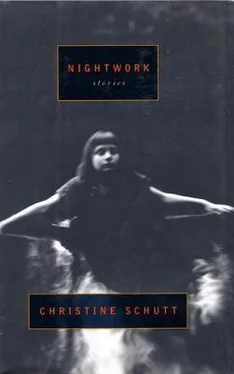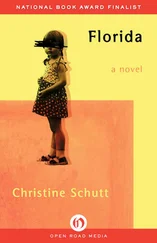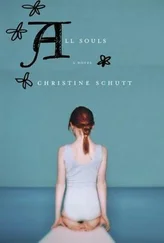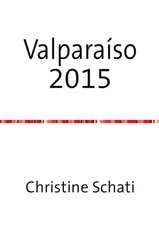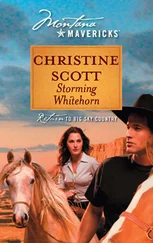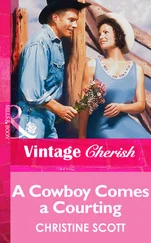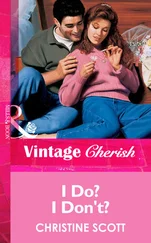“Drive faster, please,” we said to Cory’s grandma. “We are too many in this car. It is hard to breathe.”
Under the driver’s thumb, all the windows hummed down at once.
“Air!” we said, and breathed.
Scabs in the spring air on the compound, cottonseed and petals, early bees and trembling webs, dews, worms, some stones in the sun already warm against our feet — remember spring there? How Jerry caught us in our nightgowns, how he stared? I was ashamed — we all were. We never went outdoors again quite so undressed.
Summer, the last, the insects hung in the air unmoved, the fine threads of their legs just a riffle. We went looking for water beyond the fields, broke through pokered plants to the mud bank, wet-bark brown that was a river. There, crouched, we spit white spit to watch the fish puck at the surface to eat it. I was next to the older boy, the one we never asked to come along but who sometimes came along, took his pants off, made to swim. The older boy dangled his martyred feet in the river. I watched them drift in the sluggish current and saw, too, the dark sacs of his sex, legs apart, water to his knees. Unmuscled arms and narrow shoulders, tender neck and skull, near bald he was, that older boy, ghostly border over nuded ears. We knew which mother had done that to him — and she in tears. But the older boy was a dirty boy; we saw that much about him. Chewed-up lips and blood stars on his cheeks from scratching, the older boy was angry. We were right to leave him.
Cory’s grandma said, “Not if I had had more room in this car. If I had had more room in this car, I would have gathered up all of you children.”
Jerry used to say things like that, too. On a painfully bright day, when I remembered I might otherwise be in school, I stood — we all stood — at the bleached field under a dark blue sky and listened to him loving us: surcease and promise. Jerry’s throat tightened when he spoke, and he unbuttoned his shirt, and we saw the flushed and grizzled heart he beat when he was speaking to us as Jerry was speaking to us. Children, he said, and we were all children — even the mothers — we belonged to him, which was belonging to something more than to a man.
“What are you crying about, you baby, you sister? You didn’t even understand what he was saying. You were winding yourself in Mother’s skirt. You said you were cold; you said you couldn’t see,” I said, although we all had to admit it was hard to see him with his back to the sun and our own eyes dazzled from wherever in the sky the sun was shining. Jerry was just a cutout; even his face was black, and his hair, wet slash in his pacing, water dripping off his chin — we never knew a man could dribble as though he were a spigot you could drink from.
I wanted to be his favorite, but when it seemed I might be, I grew afraid of Jerry’s snouty fingers sniffing in the dark, his gentling, “You, is this you? Have you been waiting?”
“Oh, I am glad you children wrote me,” Cory’s grandma said, and we said we were glad, too. The winter had been hard. Cindered mouth and blank dawning, we slept near to fires and woke, crying, “Water!” running after it to the greenhouse with a jar, jumping over babies, their puckered hands smudged black. We wouldn’t touch them, though the mothers stomped and cried out, “Will you take that baby with you!” But we were after water, running over frozen earth in the fossilized boot tracks of someone’s earlier departing in a thaw, in a hurry — other mothers it had been, not ours. Ours were in the common room, waiting for water. They were waiting for Jerry’s instructions: what to do next.
Sell your plated silver; close your thin accounts.
“Don’t you remember our first house?” I asked my sister. Father’s indentations in the soft couch not yet cold, and already on the curb that Jerry.
“But I liked him,” my sister said. “I was carried when I didn’t want to walk. He promised he would show me things outside the county.”
“Jerry had nothing in his pockets for us,” we said. “His hands were empty and hairless.”
“Soft,” my sister said, “warm.”
“Moist, maybe,” the fingernails cracked, stained. I remembered, too, the fingertips steepled, pressed against his lips as he considered what to do with the stuttering boy when the stuttering boy cried at the table, his face a leaky sore at the mention of a father — anyone’s father — when his was dying, was probably dead. “I thought you were grown up,” is what Jerry had said, before he took him to the greenhouse and left him bleedy at the spigot.
Cory’s grandma said, “Lordy, Coreen, where was your mother in all of this? How was it this Jerry had such a hold?”
“The mothers were easy,” we said. They only wanted a word — a sweetheart or a honey.
The mothers said Jerry’s gentleness reminded them of fathers who had had to do hard things for which they yet seemed sorry.
But the man we’re talking about was never sorry. Jerry backed up over the older boy’s old dog and left the bitch for us to bury. He took the money that our grandparents sent — it was lucky someone knew how to sneak us a stamp!
“Lordy,” Cory’s grandma said, “lucky!”
“It was lucky you came,” we said, when at the windows Jerry said he saw faces — but looking in on what? Mothers putting waxy sacks of white bread on the table, sticks of softened butter? The babies in the common room were licking the TV while the in betweens were slunk on bunk beds, playing who will you marry and what will you be. Not a lot to look in on, although we hoped someone was looking in on the stuttering boy with his mouth taped shut, so that his sound was all blurred howling — and that to rouse his mother from what the man had done to her when she had said, “But Jerry, the boy only wants to see his father before the man is dead.”
We said to Cory’s grandma, “We knew our letter to you could mean trouble, and we kept some children out of it. We didn’t want anyone hurt.”
“Do you understand,” we asked my sister, “we made some sacrifices. Not everyone is here, you’ll notice. Some are missing.” Some are in the greenhouse still, ripping sheets to strips to stuff the holes with, stop the moaning. The piss pot in the basement, the slops beneath the sink, some child is there, too, cleaning and sweeping the way he had us do to cover the boot tracks and clean the greenhouse of the flowers stood on end, their ganglia of dark roots wire-stiff, their leaves dissolving.
“Have you forgotten,” we asked my sister, “those others we left to their suffering?” The stuttering boy and his bleeding tongue, Naomi with her bruises were only some of what we left behind. There were babies and crawlers, children after mothers, mothers far away if it is mall day — remember? “Remember them?” Fluttering inky dittos, the mothers wander malls, seeking others like themselves. What is it that brought us here, they may wonder, but the vacant face in the darkened window, the one we saw in passing and had to claim as ours?
“Those mothers sound drugged,” Cory’s grandma said.
Sometimes, yes, they moved that way. In the river, after standing an eternity cut off at the ankles, they walked — dared to walk — along the shallow stony bottom, moving as mystics move with feet turned out over nails or coals; when pierced by some sharpness or benumbed by the cold, the mothers kneeled into the water and swam out. White necks and weedy hair on these mothers who squealed in the open air, sharing worn soaps and saying, “Doesn’t this feel good after such a winter?”
“Stop crying!” I said to my sister. “You and your tears — you sticky baby, you aren’t the only one who misses Mother.”
“Of course,” said Cory’s grandma, “but see here,” and she pointed to the streaked trees outside the car windows. “Look, children, what we are coming to!” Tasseled shrubbery and ragged bibs of lawn, snow shovels on front porches, narrowing blocks, less green and higher buildings, chips of colored light blinking on for evening — and us driving into it. April this was, mid-April, May, when the cold rains kept the earth black, before anything could burn.
Читать дальше
